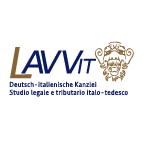INHERITANCE LAW AND INHERITANCE TAX LAW
LAVVIT advises on wills and estates in Germany
Death is not (also) legally the end: the succession of property and the estate of the deceased should be settled beforehand. LAVVIT inheritance lawyers help with this: With the drafting of the will and, in the event of inheritance, with the enforcement of the inheritance.
German inheritance law applies to all inheritance cases if the deceased had their habitual residence in Germany. Nationality no longer plays a role in inheritance law, only habitual residence in Germany. German inheritance law thus applies to Germans, EU citizens such as Italians or French, as well as non-EU citizens such as Albanians or Russians, provided they live permanently in Germany.
This opens up completely new possibilities for all Italians in Germany to regulate their estate: German inheritance law gives the testator more rights than Italian inheritance law. The estate can be regulated by an individual or joint will, by inheritance contract or donations upon death or legacies. You are no longer bound by the legal line of succession and can, for example, pass on children and inherit them directly to your grandchildren or your favourite niece.
The legal succession
Legal heirs of the so-called first order, i.e. those with priority rights, are the children of the testator and their descendants (inheritance according to tribes). If the deceased leaves no children, their parents or their descendants (second-order heirs) inherit. Third and fourth level heirs are the grandparents and great-grandparents or their descendants. In addition, the spouse of the deceased is automatically the heir and receives at least half of the inheritance as well as the household items and wedding gifts from different regulations.
Testament
In Germany, the testator can regulate his or her estate according to his or her free will, independently of the law. The statutory right to a compulsory portion only limits him a little. The will must be handwritten, dated and signed, otherwise it has no legal effect. LAVVIT advises on the formulation of wills. In case of doubt, numerous legal rules of interpretation can lead to a completely different distribution of the inheritance than the testator wanted. Legal advice is essential here.
Legacy
The testator can also order a legacy. In doing so, he obliges the heirs to return a specific item, an amount of money, a claim or similar to the beneficiary of the legacy. Since it is not easy to formulate whether a person should become an heir or a legatee, LAVVIT helps with the formulation.
Joint Will
Spouses can also formulate a joint will, a so-called Berlin will, which means that they can dispose of their entire joint estate in a single will. The surviving spouse is then bound by it and can no longer cancel the joint dispositions after the death of the first deceased. It is usually determined that the survivor becomes the sole heir and that the joint children only inherit after the death of the last deceased spouse. However, a joint will is only advisable for small assets, since two inheritance tax processes arise for one asset. If the assets are not below the tax exemption limits for each inheritance, LAVVIT advises against this form of will. LAVVIT checks with the client whether a joint will make sense and also helps with the wording, explains the consequences and shows alternative inheritance structures in individual cases.
Such a will is not advisable for foreigners from the Roman legal family, i.e. Italians, French or Spaniards. If they die in their homeland, the joint will, will be null and void.
Contract of inheritance
One form of inheritance regulation, that is particularly advisable for non-EU residents, is the inheritance contract. At least two people can jointly dispose of their assets. The inheritance contract is drawn up in front of a notary. Content can only be heir appointments, legacies and editions. The inheritance contract is recognized by all EU member states. LAVVIT works out a joint inheritance contract with its clients.
Compulsory portion
According to German law, children, spouses or parents of the deceased (persons entitled to a compulsory share) can be excluded from the inheritance by means of a will or contract of inheritance. Then you are only entitled to the so-called compulsory portion. The compulsory portion consists of a contractual right to half of the statutory portion of the inheritance, but can be further reduced by donations from the testator. Those entitled to a compulsory portion have a right to information from the heirs regarding the value of the entire inheritance.
Inheritance law for entrepreneurs
Entrepreneurs, especially shareholders in corporations or partnerships, need special advice. LAVVIT advises entrepreneurs and explains how they can protect their estate so that their life's work can continue after death.
Inheritance Tax Law
In all considerations regarding the estate, German – and in cross-border cases also foreign, such as Italian – tax law must be observed. The closest family members pay the lowest taxes and have the highest allowances. Since inheritance and gift tax are the same, it will make sense for larger assets to consider an inter vivos gift.
Automatic inheritance
In Germany, the so-called universal succession applies. This means that the heir becomes heir at the moment of the death of the testator whose assets and liabilities he takes over. There is no need for an explicit acceptance of inheritance, as is the case in Italy, for example. However, the heir cannot dispose of the estate immediately. The heir must apply to the probate court for a certificate of inheritance so that he can prove his status as an heir to banks or the land register. If the estate is overindebted, the heir can refuse the inheritance. Often several people inherit an estate together. You are then a community of heirs and suddenly find yourself exposed to rights and obligations. LAVVIT supports its clients in all of these situations.
The inheritance dispute
Inheritance disputes have existed as long as there have been people. LAVVIT helps its clients to enforce their inheritance law - in Germany as well as in Italy. We assert claims for information and fight for inheritance rights in court. Before that, we check the legal situation intensively. In German inheritance law, there are a number of bases for entitlement to enforce information and claims of those entitled to inherit.
The EU Succession Regulation
The EU Inheritance Regulation stipulates that the succession is regulated and processed according to the law of the state in which the deceased had his last habitual residence. German inheritance law applies to all testators who had their habitual residence in Germany before their death.
However, the applicable inheritance law can also change: if an Italian who has lived in Germany all his life moves back to the homeland of his forefathers for the last few years of his life, the applicable law suddenly changes and Italian inheritance law then applies when he dies. This can lead to unwanted estate distributions. LAVVIT therefore advises all Italians and other EU foreigners to draw up a will or an inheritance contract. By choosing the applicable inheritance law in the will or contract of inheritance, unwanted distributions of the estate can be avoided.

